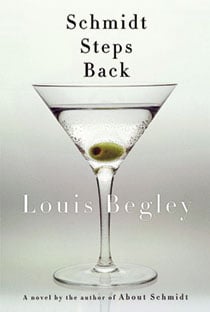 In Schmidt Steps Back, the third instalment of the series by Louis Begley that began with About Schmidt (on which the 2002 film was glancingly based), Schmidt (or Schmidtie, as he hates his given name, Albert) is 78 and in fine fettle. He is healthy—he figures he’s got 10 years of good health left. He is wealthy—a fat pension from his law firm and a home in the Hamptons. And he is wise, a much more likeable man than his younger self.
In Schmidt Steps Back, the third instalment of the series by Louis Begley that began with About Schmidt (on which the 2002 film was glancingly based), Schmidt (or Schmidtie, as he hates his given name, Albert) is 78 and in fine fettle. He is healthy—he figures he’s got 10 years of good health left. He is wealthy—a fat pension from his law firm and a home in the Hamptons. And he is wise, a much more likeable man than his younger self.
It is New Year’s Eve 2008, and he is looking forward to the arrival from Paris of Alice Verplanck, a woman he hopes to marry—though they have been apart for 13 years, when “jealousy and its cognate envy, blind pride, and quick unforgiving anger” drove her from his life. And so Schmidt steps back and audits those intervening years—his affair with Alice; the fractured truce with his estranged daughter, Charlotte, her vile husband and in-laws; and his affection for Carrie, the twentysomething Puerto Rican waitress who will have a baby whose father is either Schmidt or Jason, her new love.
Schmidt Steps Back is an evocation of an old age lived well. (Author Begley is 78, so he knows whereof he writes.) There has been tragedy and loneliness but Schmidt has borne it well. He remains fascinated by the political dramas unfolding around the world. Lunch with a male friend involves much storytelling and more than one bottle of wine. And he remains keenly interested in sex (Begley has said he has aroused himself with his vivid depictions of the act).
The big difference between creator and created is that Begley is a Jew, Schmidt an ultra-WASP, a bit square, a bit squeamish (or at least hyper-aware) of Jewishness, homosexuality and the other exotic lifestyles that pass before him. Begley chose Schmidt, no doubt, so he could look at questions of Jewish identity in American society. But there is more. Schmidt knows a Jewish writer who says he once chose a gentile protagonist so he wouldn’t be regarded solely as a Jewish novelist: “Who would want to stand in the shadow of Bellow and Roth?”